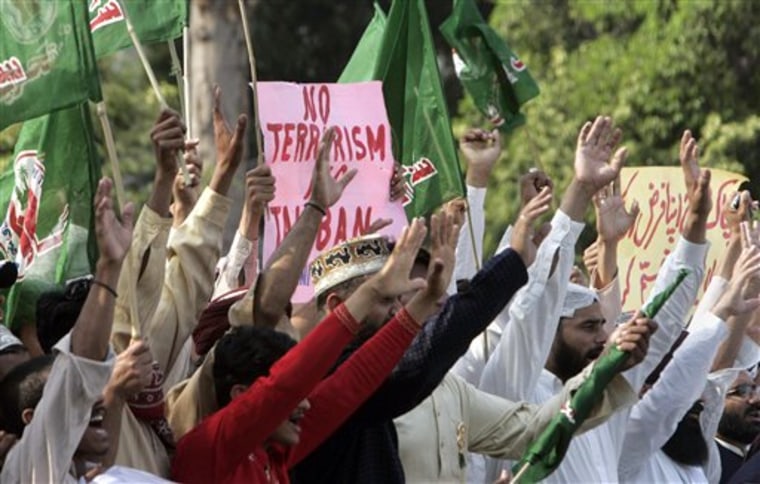President Barack Obama will seek assurances this week from Pakistani President Asif Ali Zardari that his country's nuclear arsenal is safe and that Pakistan's military intends to face down Taliban extremists in coordination with Afghanistan and the United States, U.S. officials said Monday.
Although the administration thinks Pakistan's nuclear weapons are secure for the moment, concern that militants might try to seize one or several of them is acute. Those anxieties heightened amid the Taliban's recent advances and American worry about the commitment from Pakistan's government and military in battling the extremists, the officials said.
White House spokesman Robert Gibbs said Monday that questions about the safety of Pakistan's nuclear weapons will likely come up at the talks with the south Asian nation's leaders. Other U.S. officials said the matter would definitely be on the table.
"I don't doubt that that will be mentioned," Gibbs said.
'The highest priority'
Gibbs said that "the security of nuclear weapons in Pakistan and the security of nuclear material throughout the world is something that the president thinks is of the highest priority."
Officials said the situation in Pakistan and Afghanistan will be discussed Tuesday at a National Security Council meeting at the White House. Senior officials involved in intelligence, foreign policy and defense will be in attendance, officials said.
Prominent among U.S. worries is the possibility that extremist sympathizers in Pakistan's military or intelligence services could tip off militants to the movement of nuclear weapons from their current guarded locations.
The administration feels that if the weapons are moved, it could be a real problem, said a senior official familiar with U.S. policy in South Asia. The official and other unnamed U.S. officials spoke on condition of anonymity because of the sensitive nature of the upcoming talks.
Nuclear safety
The Pentagon's top military officer, Joint Chiefs of Staff chairman Adm. Mike Mullen, told reporters Monday that he was comfortable about the current security of Pakistan's nuclear weapons. But he demurred when asked if he was confident in their continuing safety.
He noted that the U.S. has worked with the Pakistanis to improve the security of their nuclear arsenal and he believes that country's military is focused on keeping them secure.
"I know what we've done over the last three years, specifically, to both invest, assist (Pakistan), and I've watched them improve their security fairly dramatically over the last three years," Mullen said.
Fears that Zardari's government could crumble have tempered but officials said extremist infiltration of the military and intelligence services could compromise the safety of nuclear weapons.
A U.S. counterproliferation official said there was no sign that Pakistan's nuclear weapons have been compromised, "it makes sense to send a strong message to the Pakistanis that they need to take a close look at even the most minor of potential vulnerabilities."
'Effective command and control system'
Pakistan's ambassador to the United States Husain Haqqani said the administration should have no fears.
"They know we have an effective command and control system in place and that our safety standards are the same as other nuclear capable countries," he told The Associated Press, adding that: "at no stage have Pakistan's nuclear weapons been unsafe."
Mullen, meanwhile, cautioned that he remained "gravely concerned" about the Pakistan military's ability to sustain operations inside Pakistan and in the border areas.
"The consequences of their success directly threaten our national interests in the region and our safety here at home," Mullen said.
Battle against the Taliban
Obama and Zardari will meet, along with Afghan President Hamid Karzai, at the White House on Wednesday as U.S. officials host the leaders and their top security and diplomatic aides for two days of talks in an effort to beat back what has become one of the administration's most troubling foreign policy challenges.
In those sessions, U.S. officials said they will make clear that they want to see sustained and concerted action against extremists in the vein that the Pakistani military took last week after the Taliban moved to within 60 miles of the capital.
"I think the Pakistan government and military have received the message," State Department spokesman Robert Wood told reporters. "However, that message continues to need to be reinforced."
Complicating attempts to better coordination between the three countries are Zardari's own internal weaknesses — that have led U.S. officials to consider trying to broker a power-sharing deal between him and opposition leader Nawaz Sharif — as well as Karzai's uncertain status and choice of a vice presidential running mate in elections set for August.
Karzai on Monday selected Mohammad Qasim Fahim — a powerful warlord accused of numerous human rights violations and corruption — as his running mate, in a move the U.S. administration feels is problematic, the senior official said.
U.S. officials say success in the Afghanistan war is linked to security in Pakistan and stability and development in both nations.
Part of this week's meetings will focus on setting benchmarks for economic, political and military progress in Afghanistan and Pakistan. Such progress will be threatened if either government loses credibility with their people.
